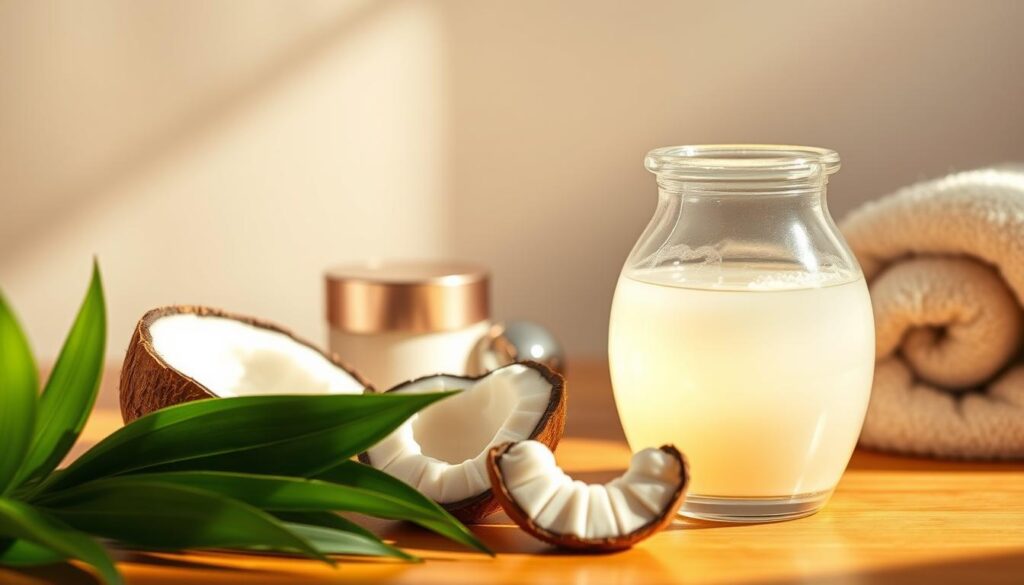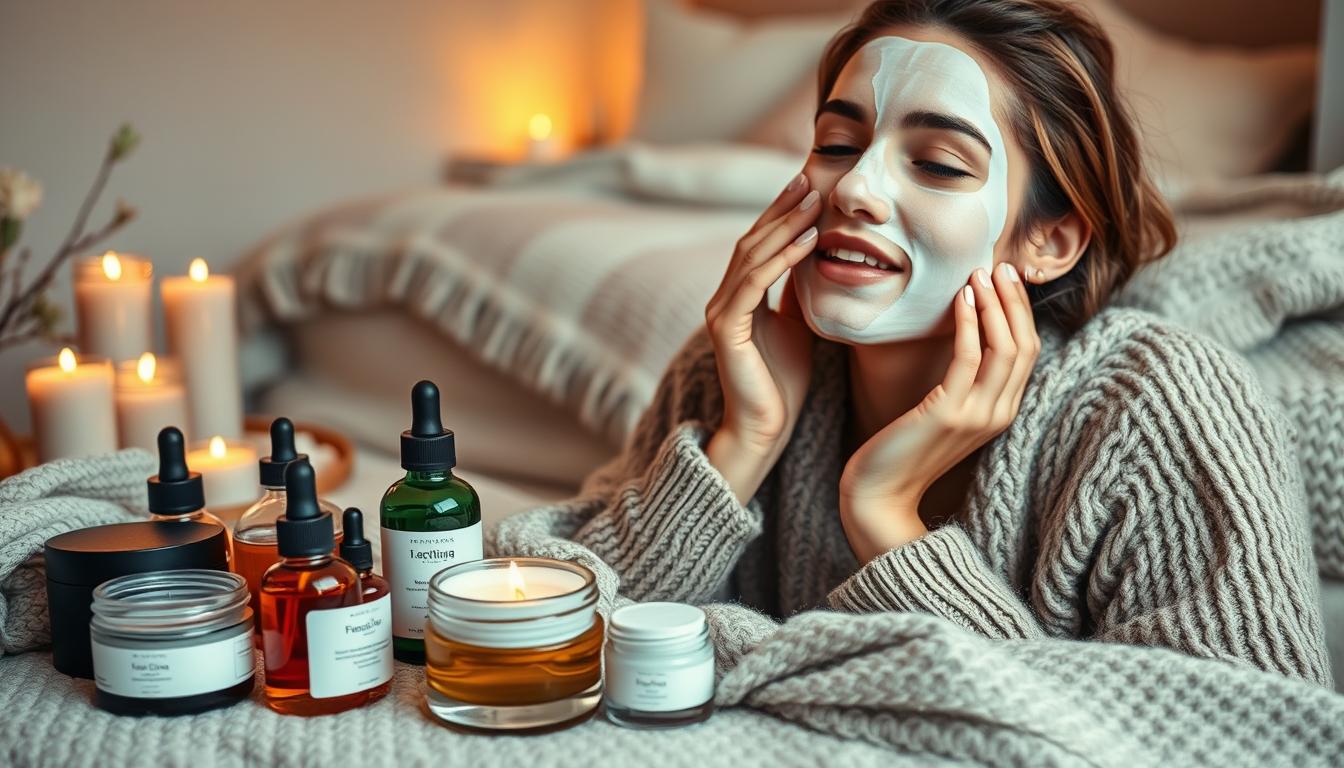When it gets colder, dry skin can be a big problem. With humidity levels often below 10%, it’s easy to see why so many people struggle with it.
But there’s hope. You can fight dry skin and keep your skin soft and moisturized. With the right skincare tips for winter, you can have healthy, hydrated skin all season.
Key Takeaways
- Understand the causes of dry skin in winter
- Learn effective winter skincare routines
- Discover the best moisturizers for dry skin
- Find out how to protect your skin from harsh winter conditions
- Explore additional tips for maintaining healthy, hydrated skin
Understanding Cold Weather’s Impact on Skin
It’s important to know how cold weather affects your skin. This is key to keeping your skin healthy and moisturized in winter. The cold weather lowers humidity, which can dry out your skin.
The skin’s outer layer, the stratum corneum, helps keep moisture in. But in cold weather, this layer gets weaker. This makes it easier for water to escape, leaving your skin dry and tight.
Why Cold Weather Dries Out Skin
Cold weather dries out your skin because of low humidity. Dry air takes moisture from your skin, causing dehydration. Cold winds also remove your skin’s natural oils, making it even drier.
It’s vital to know that cold weather weakens your skin’s moisture barrier. This can cause dryness, irritation, and even eczema.
How Indoor Heating Affects Skin Hydration
Indoor heating is needed for warmth in winter. But it can also dry out your skin. Heating systems lower indoor humidity, making dryness worse.
- Heating systems dry out the air, leading to increased moisture loss from your skin.
- This can result in skin that feels tight, dry, and irritated.
- Using a humidifier can help counteract this effect by adding moisture back into the air.
By understanding these factors, you can protect your skin in winter. This ensures it stays healthy and moisturized.
Essential Ingredients to Look for in Moisturisers
When it gets colder, your skin needs extra care. Moisturizers with hyaluronic acid, ceramides, and glycerin are key. They help keep your skin moist and shield it from harsh winter air.
Hyaluronic acid is a top choice for keeping moisture in. Ceramides fix the skin’s barrier, and glycerin offers lasting hydration. Look for these ingredients in your moisturizer to keep your skin soft and healthy all winter.
Daily Skincare Routine for Winter
To keep your skin healthy and hydrated during winter, it’s key to stick to a skincare routine.
Morning Routine
Start by washing your face with a gentle cleanser. This removes dirt and impurities. Next, apply a moisturizer to keep your skin hydrated and protected from the cold.
Nighttime Routine
At night, clean your skin twice to get rid of makeup, dirt, and pollutants from the day. Use a gentle exfoliant with alpha-hydroxy acids (AHAs) or beta-hydroxy acids (BHAs) one to three times a week. This helps your skin renew itself.
| Product | Benefits |
|---|---|
| Gentle Cleanser | Cleanses without stripping natural oils |
| Moisturizer | Hydrates and protects the skin |
Simple Tips to Maintain Skin Hydration
Winter weather can be tough on your skin. But, there are easy ways to keep it moist. It’s not just about the right skincare products. It’s also about habits that keep moisture in.
Drink Plenty of Water
Drinking water is key for body hydration and skin health. Aim for at least 8 glasses a day to keep your skin moist. Eating hydrating foods like watermelon and cucumbers also helps.
Humidifiers: A Skin’s Best Friend
Dry air can dry out your skin. So, keeping your home’s humidity level healthy is important. Using a humidifier adds moisture back into the air. It’s great for bedrooms where you spend a lot of time.
Here’s how humidifiers help:
| Benefits | Without Humidifier | With Humidifier |
|---|---|---|
| Skin Moisture Level | Low | High |
| Comfort Level | Dry, itchy skin | Soft, hydrated skin |
| Air Quality | Dry air | Moist, comfortable air |
By adding these simple tips to your daily routine, you can protect your skin from winter’s harshness. You’ll keep your skin healthy and hydrated.
Importance of Exfoliation in Winter
To keep your skin healthy and glowing in winter, exfoliation is key. It removes dead skin cells, helping your skin look better. But, be careful not to exfoliate too much, as it can dry out your skin.
How to Exfoliate without Damaging Skin
Exfoliating in winter needs to be gentle. Exfoliate once or twice a week, depending on your skin. If you have sensitive skin, start with a soft exfoliant and then move to stronger ones if needed.
Always moisturize after exfoliating to keep your skin hydrated. Choose exfoliants with alpha-hydroxy acids (AHAs) or beta-hydroxy acids (BHAs) for a gentle yet effective clean. Physical exfoliants like scrubs or brushes are also good, but be gentle.

Recommended Exfoliating Products
Here are some good exfoliating products:
| Product | Type | Key Ingredients |
|---|---|---|
| Dermalogica Daily Microfoliant | Gentle daily exfoliant | Rice bran, alpha-hydroxy acids |
| Paula’s Choice 2% BHA Liquid | Chemical exfoliant | Salicylic acid |
| Tatcha Polished Rice Enzyme Powder | Enzyme exfoliant | Rice bran, papain |
For more tips on exfoliating in winter, check out essence.com.
Best Moisturisers for Dry Skin
Choosing the right moisturiser is key to fighting dry skin. In winter, your skin needs extra care to stay moist and soft. Look for moisturisers with ceramides, hyaluronic acid, and glycerin. These ingredients help keep moisture in and support your skin’s barrier.
Top Drugstore Finds
On a budget? There are great drugstore moisturisers for dry skin. Search for products rich in emollients and humectants. Here are some top picks:
- CeraVe Moisturizing Cream, packed with hyaluronic acid and ceramides for lasting hydration.
- Neutrogena Hydro Boost Water Gel, a light option that uses hyaluronic acid to keep moisture in.
- Aquaphor Healing Ointment, a versatile ointment that deeply hydrates and protects dry skin.
These moisturisers are effective and affordable. They’re perfect for your winter moisturizing routine.
Luxury Brands Worth Considering
Want to splurge? Luxury moisturisers offer advanced hydration and skin benefits. Here are some:
- La Mer Moisturizing Cream, famous for its Miracle Broth that hydrates and nourishes dry skin.
- Drunk Elephant Protini Polypeptide Cream, a cream that combines peptides and vitamins for better skin elasticity and hydration.
- Sisley Paris Black Rose Skin Infusion Cream, a luxurious cream that provides long-lasting hydration and soothes dry skin.
These luxury moisturisers use top-quality ingredients for intense hydration and nourishment. They’re great dry skin remedies for winter.
Whether you pick a drugstore find or a luxury brand, the most important thing is to find a moisturiser that suits your skin. This way, you can keep your skin soft, hydrated, and healthy all winter.
Natural Remedies to Keep Skin Moisturised
Winter can be tough on your skin. But, there are natural ways to keep it moisturized and healthy. These remedies are effective and don’t use harsh chemicals.
Coconut Oil and Its Benefits
Coconut oil is great for moisturizing your skin. It’s full of fatty acids, like lauric acid, which nourishes and hydrates. Using coconut oil after a shower keeps your skin soft and supple. You can also mix it with other natural ingredients for extra benefits.
Coconut oil offers several advantages:
- Deep hydration
- Rich in antioxidants
- Soothes dry, chapped skin

DIY Masks for Extra Hydration
DIY masks can give your skin a deep hydration boost. Ingredients like honey, avocado, and oatmeal make great masks. For example, a mask of mashed avocado and honey is very hydrating. Use these masks once or twice a week for the best results.
Here are some easy DIY mask recipes:
- Avocado and Honey Mask: Mix mashed avocado with a tablespoon of honey and apply for 20 minutes.
- Oatmeal and Yogurt Mask: Combine cooked oatmeal with yogurt and a bit of honey for a soothing mask.
Using these natural remedies can help keep your skin healthy and moisturized all winter.
The Role of Diet in Skin Health
Your diet greatly affects your skin’s health and hydration, more so in cold climates. Eating a balanced diet with essential nutrients can make your skin stronger against environmental stress.
Foods rich in antioxidants and omega-3 fatty acids protect your skin cells. These nutrients are key for keeping your skin’s barrier strong, which helps retain moisture.
Foods that Boost Skin Hydration
Adding certain foods to your diet can increase skin hydration. Foods like salmon and walnuts are great for skin health because they’re full of omega-3 fatty acids. Foods with lots of antioxidants, like berries and leafy greens, also help keep your skin healthy by fighting oxidative stress.
Cucumbers and watermelon are also good for hydration because they’re full of water. Eating a variety of these foods can help keep your skin hydrated from the inside.
| Food | Nutrient | Benefit to Skin |
|---|---|---|
| Salmon | Omega-3 Fatty Acids | Supports skin’s barrier function |
| Berries | Antioxidants | Combats oxidative stress |
| Cucumbers | Water Content | Contributes to hydration |
Vitamins and Supplements to Consider
Some vitamins and supplements can also help your skin. Vitamin C is good for antioxidants and can make your skin look brighter. Vitamin E helps protect your skin from damage caused by free radicals.
Supplements like omega-3 fatty acid capsules can be helpful if you can’t get enough from food. But, always talk to a healthcare professional before starting any new supplements.
By eating well and using the right skincare, you can keep your skin healthy and hydrated, even in cold weather.
Activating Body Moisturisation
Moisturizing your body is key, more so in dry winter months. To keep your skin soft and hydrated, a consistent moisturizing routine is vital.
Effective Techniques for Dry Areas
Dry skin areas like elbows and heels need extra care. Applying moisturizer directly to these spots helps lock in moisture. Using a rich moisturizer or body butter on these areas provides deep hydration.
Exfoliating these areas gently before moisturizing helps remove dead skin cells. This also improves how well the moisturizer absorbs.
| Dry Skin Area | Recommended Moisturizer | Application Tip |
|---|---|---|
| Elbows | Rich Body Butter | Apply after exfoliating |
| Heels | Thick Moisturizing Cream | Use overnight with socks |
| Knees | Hydrating Body Oil | Massage in circular motions |
Timing is Everything
Applying moisturizer at the right time is key. You should apply it immediately after a bath or shower, when your skin is wet. This traps moisture in.
This method creates a barrier on your skin’s surface. It prevents water loss, keeping your skin hydrated longer.
By adding these tips to your daily routine, you can fight dry skin in winter. Remember, consistent moisturizing is essential for soft, healthy-looking skin.
Seeking Professional Help for Persistently Dry Skin
If your skin stays dry even after trying to moisturize it, it’s time to see a professional. Dealing with dry skin in cold weather can be tough. You might need more than just moisturizers from the store.
Identifying the Need for Professional Advice
Severe dry skin needs a dermatologist’s help. They can check your skin and suggest treatments. This might include special creams or ointments made just for you.
Effective Treatments for Extreme Dry Skin
A dermatologist can offer many treatments for dry skin. This includes creams, pills, or other therapies. Getting expert advice can help keep your skin healthy and moisturized all winter.
FAQ
What causes dry skin during winter?
Cold weather and low humidity dry out the skin. Indoor heating also dries it out.
How can I keep my skin hydrated during winter?
Use a moisturiser with hyaluronic acid, ceramides, and oils. Drink lots of water. A humidifier helps keep your skin moist.
What are the best ingredients to look for in a winter moisturiser?
Look for hyaluronic acid, ceramides, and oils like coconut, olive, or jojoba. These lock in moisture and protect your skin.
How often should I exfoliate my skin during winter?
Exfoliate once to three times a week, based on your skin type. Be gentle to avoid stripping your skin of oils.
Can diet affect my skin’s hydration levels?
Yes, eating foods rich in omega-3s, vitamin E, and antioxidants helps. Include salmon, nuts, and leafy greens in your diet.
When should I seek professional help for dry skin?
If your dry skin doesn’t improve with skincare, or if it’s severe, see a dermatologist. They can offer tailored advice and treatment.
What are some natural remedies for dry skin?
Coconut oil, shea butter, and honey are great for dry skin. Try DIY masks with avocado, oatmeal, and olive oil for extra moisture.
How can I activate body moisturisation for dry skin areas?
Apply moisturiser right after bathing or showering, when your skin is damp. Use gentle, massaging motions. Focus on dry areas like elbows and heels.

